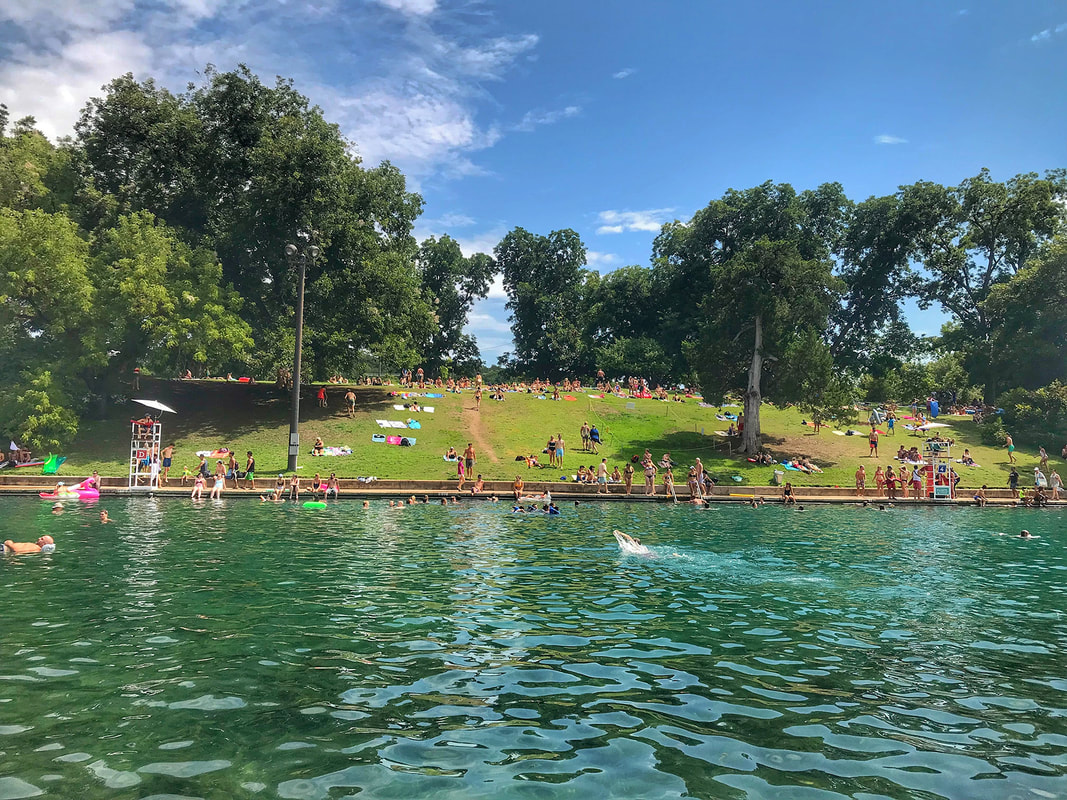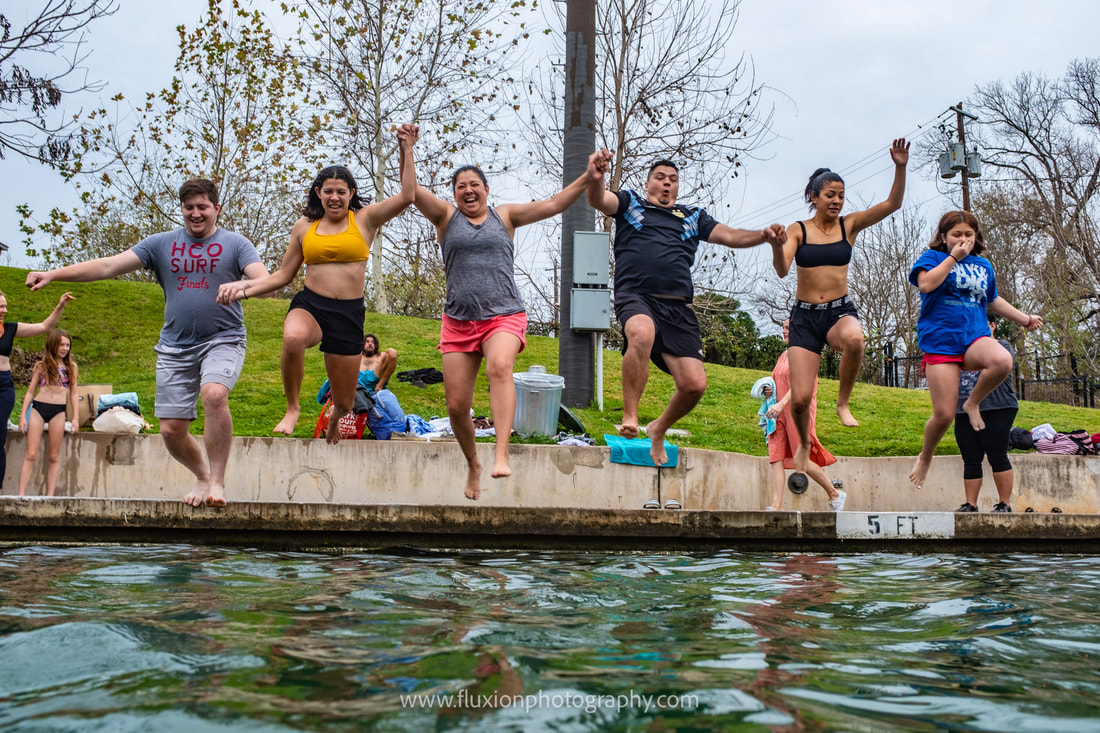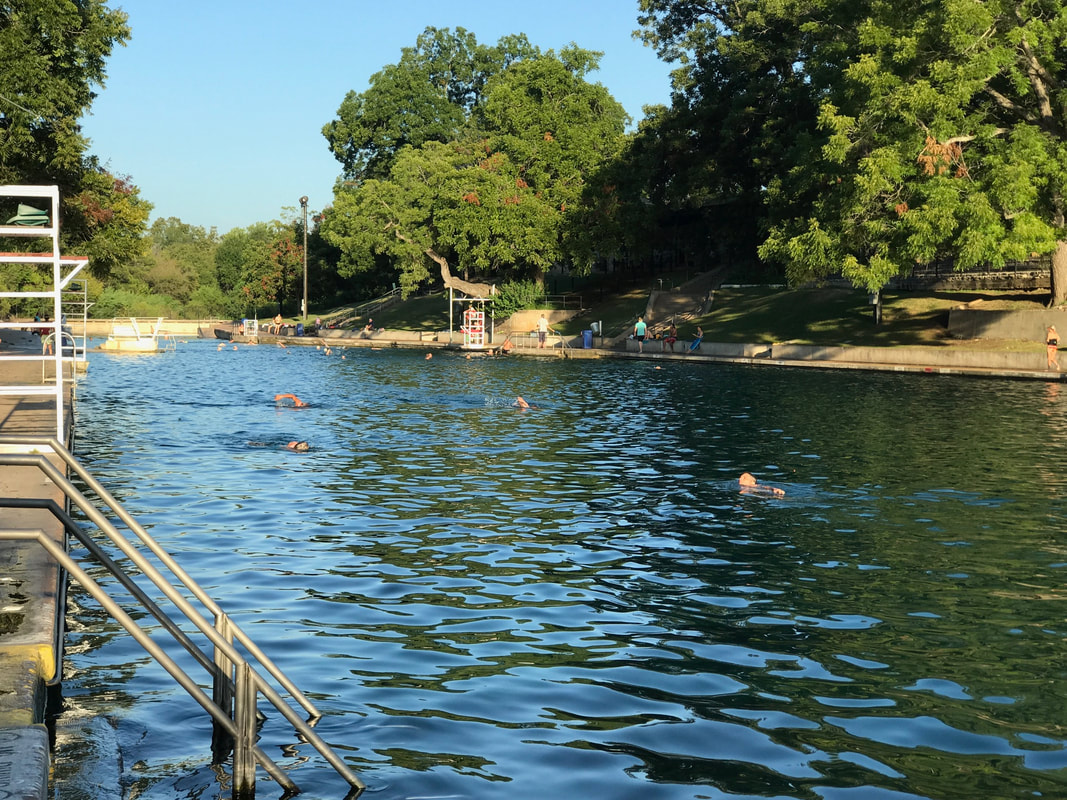|
Barton Springs University
In September, we had to cancel for the second year, BSU Day at Barton Springs due to Covid-19. The BSU team has continued growing our Educational Programming throughout 2021. The Austin Parks and Recreation Department leadership has allowed us to expand our educational programs at Barton Springs, on the creek, and in other Austin parks. This will include desperately needed kid camps during the summer months. We have also worked on producing new video and classroom materials, including a class about “the weirdest fish in Austin”, the American River eel. Barton Springs University is now a year-round series of educational events, snorkeling eco-tours, and summer camps, highlighted by a full day of outdoor learning at Barton Springs Pool in September. Visit BartonSpringsUniversity.org for more information. Protecting Our Public Parks from Overdevelopment and Privatization SOS has taken a leading role in advocating for keeping our City of Austin parks open to the public for connection with nature and outdoor recreation, and for managing and restoring our park lands and habitats. Zilker Park and Lady Bird Lake in particular have been targeted for excessive development and commercialization. SOS commissioned the Rewilding Zilker Park plan, prepared by restoration ecologist and park planner Elizabeth McGreevy. You can view the plan here. We are now working with Zilker, Barton Hills, Bouldin Creek and other neighborhood associations to advocate for a greener, healthier, more accessible, and more climate-protective future for Zilker Park in the context of the City’s ongoing Zilker Park Vision Plan. Working with SOS members, lifeguards, and swimmers, we kept the City from selling alcohol at the new Barton Springs concession stand/cafe. We also kept the proposed new Dougherty Arts Center from being located in the middle of Butler Shores and on top of the hike and bike trail (which would have converted this natural part of the trail into an urban setting). Keeping Wastewater out of Central Texas Streams Barton Creek SOS, along with a coalition of landowners and local environmental organizations, successfully fought off a permit to discharge partially treated sewage into Long Branch, a tributary of Barton Creek. After hearing significant community concern, developer Stephen Cleveland voluntarily withdrew his permit application. San Marcos River SOS attorneys represented the San Marcos River Foundation and Texas Rivers Protection Association in two cases where developers sought to discharge wastewater into the San Marcos River. SOS successfully negotiated settlements in these two cases; committing the permittees in each case to reuse 75% of their wastewater for irrigation and other purposes; and treat any water that is discharged to the highest standards. Cibolo Creek SOS attorneys are currently representing landowners in challenging a permit to discharge nearly half a million gallons a day into a tributary of Cibolo Creek in Kendall County. Onion Creek SOS is still defending Onion Creek from the City of Dripping Springs’ application to discharge wastewater into this pristine recharge source for the Edwards Aquifer. After our October 2020 victory in Travis County District Court, TCEQ and Dripping Springs filed an appeal, which is still pending. Oral argument will be heard in 2022. Blanco River SOS continues to work with local residents and city officials to help shape the future of wastewater in the City of Blanco. Blanco had originally sought a permit to discharge nearly 2 million gallons of wastewater a day into the Blanco River. But that permit application has been put on hold while Blanco evaluates its options, including land irrigation and beneficial reuse, to dispose of wastewater. All Texas Rivers & Streams SOS joined 20 other Texas organizations in asking the United States Environmental Protection Agency to take away the Texas Commission on Environmental Quality’s (TCEQ) authority to administer the Clean Water Act. As the district court found in the Dripping Springs decision, TCEQ has failed to correctly apply the Clean Water Act and acknowledge the science documenting the harm that wastewater discharges inflict on pristine Hill Country creeks. The petition to EPA also documents statewide impacts from TCEQ’s failure to prevent water pollution. In April, SOS attorney Kelly Davis presented a talk entitled, “Beyond Yuck: Wastewater Discharges in the Hill Country and Beyond,” on a national platform as part of the Baylor University Aquatic Science Series. The talk was viewed by classrooms across the country and is accessible at https://nepris.com/app/videos/beyond-yuck-human-waste-clean-water-central-texas-beyond-83563 Protecting Vulnerable Environmental Features from Highway Impacts SOS attorneys represented Save Barton Creek Association and other environmental and neighborhood groups in a suit brought under the National Environmental Policy Act to challenge the Oak Hill Parkway, a 12 to 16-lane mega-highway to be built at US 290 and SH 71. SOS argued on behalf of SBCA that traffic could be alleviated without building such a Although SOS secured a short reprieve for the trees, the district court ultimately sided with the Texas Department of Transportation. Working with community activists, SOS was successful in keeping a concrete batch plant (to generate the massive amounts of concrete needed for the Oak Hill “Parkway”) off of the former Austin Community College Pinnacle campus in Southwest Austin. SOS attorneys are still engaged in a lawsuit brought under the Endangered Species Act that challenges TxDOT’s determination that the Oak Hill Parkway project will not harm the federally endangered Barton Springs salamander and Austin blind salamander. SOS attorneys rallied community members and submitted comments on the Hays County Transportation Plan and the Dripping Springs Transportation Plan. Both plans included proposed new roads that would slice through untouched Hill Country landscape, inviting more traffic and development while causing runoff pollution. SOS has joined with Dripping Springs residents to oppose several of the roads in the county and city plans, including most notably the proposed expansion and extension of FM 150. Through coalition-building and commenting, SOS is working to defeat or scale back the resurrected proposal to build a double-decker toll road over Zilker Park, Lady Bird Lake, and Austin High School known. We defeated the MoPac South toll road project in 2015, and with your help we can do it again. Ensuring Responsible Development In 2020, SOS, along with Kyle residents, sued the City of Kyle for approving a development agreement for a huge development on the banks of the Blanco River. The City resisted the suit and initially won in having the suit dismissed, but on a Motion to Reconsider, the district court reversed its decision. The City promptly appealed, and oral argument on jurisdictional issues will be held in 2022. Chief among SOS’s arguments is that the City cannot bargain or give away zoning and development authority to private developers. Shaping Water-Related Legislation During the 2021 legislative session, SOS worked hard to support HB 4146, the “Pristine Streams Bill,” which would have prohibited domestic wastewater discharges into the clearest and cleanest rivers and creeks throughout Texas. The bill passed the House and although it never made it to the Senate floor for a vote, this is the furthest such a bill has ever made it in the Legislature. SOS continues to work with the No Dumping Sewage coalition to oppose new wastewater permits and work towards a holistic, proactive solution. Protecting Endangered Species SOS joined with local scientists to petition the U.S. Fish & Wildlife Service to list the Pedernales River springs salamander as endangered. This action was prompted when developers last summer announced a large project on the Pedernales River, just across from the spectacular Hamilton Pool Preserve. SOS is working with a coalition of environmentalists and landowners to scale back a proposed Violet Crown Amphitheater, a 20,000-seat venue and entertainment district on the banks of Barton Creek. The site is surrounded by preserve land that is home to the endangered golden-cheeked warbler. Safeguarding San Antonians’ Petition Rights When the San Antonio Water System (SAWS) attempted to prohibit any citizen-petitions related to SAWS’ management, SOS attorneys blocked the maneuver in court, ensuring that citizens could continue to initiate ordinances to implement much-needed reform of SAWS. Please help us continue our work in 2022 by making a year end donation to SOS. We had enormous fun at Barton Springs on New Year's Day. (click on Read Full Article link below to access the photo links). The Polar Bear swimmers were out in force and with such warm weather folks were happy to hang around and enjoy the day. We do have some t-shirts left over. If you would like one or more, please make a donation to SOS here for $23 each shirt and we will mail them to you asap. You can put the sizes etc. in the comments section on the donate page. We will also open our office for pick ups. Please email [email protected] to schedule a time. You can view the photos on our facebook page here or on the photographer's website here.
Initial comments of the Save Our Springs Alliance on CTRMA’s “Virtual Meeting” for the restart of its proposed Mopac South project
Extend the comment period at least 30 days. The comment period fell entirely over the holidays. CTRMA’s MopacSouth.com website for the project says in bold at the very top “Latest News 08/08/2017”, which of course tells the reader that nothing is going on worthy of attention. Much of the remaining information on the site is also confusing. Extending the comment period and correcting the misinformation will help ensure robust and full public input. Prepare a full Environmental Impact Statement (EIS). As proposed, the project would add 16 to 32 lane-miles of impervious cover within the Recharge Zone for the Barton Springs segment of the Edwards Aquifer. The project will have substantial adverse impacts on Barton Springs, the Edwards Aquifer, Zilker Park, Lady Bird Lake, the Hike and Bike Trail, Austin High School, the Barton Creek greenbelt, and the endangered Barton Springs and Austin blind salamanders. Given the size of the project and ecological sensitivity of the area, the project will have unavoidable and significant environmental impacts. Preparing an Environmental Assessment in pursuit of a “finding of no significant impact” demonstrates bad faith for the entire environmental review process. Do not build a double-decker bridge over MoPac, Zilker Park, Lady Bird Lake, and Austin High School. Avoid taking any park land or encroaching on Austin High School property. Fully evaluate a “no build” or “very limited build” alternative that improves traffic flow using the existing pavement, including dedicating an existing inside lane to rush hour “high occupancy vehicles” (HOVs) and public transit, utilizing ramp metering, and updating traffic modelling that recognizes a post-covid world where tele-commuting, flexible work schedules and other technological and societal changes have largely eliminated the necessity of spending more than half of a billion dollars trying to accommodate previously predicted “single occupancy vehicle peak hour demand” increases. Update the traffic modeling data and give the public another opportunity to give input before selecting a “preferred alternative.” The Open House materials indicate that the traffic data uses the 2009 model that supported the long-range 2035 CAMPO regional plan. The materials further state that it will be updated to 2045 data at a later point (presumably after the initial public comment period has ended). CTRMA should update MoPac information with current data and a functional traffic model—and allow public comment on that analysis. The 2035 model, now more than 10 years old, was problematic then and virtually useless now. Updated traffic modeling should include COVID traffic counts and the best current information on projecting traffic flows, recognizing that improved transportation technology will greatly increase efficient use of the existing pavement. The giant leap forward in telecommuting means a different world in the future. Neither the 2035 Model nor the 2045 model has any conception of this new world. Both also ignore the “induced demand” problem that has shown, time after time, that expanding roadways in urbanizing areas fails to reduce congestion to any significant degree. Analyze real alternatives to added toll lanes. The six “alternatives” offered are all variations on one concept—adding toll lanes to MoPac South. Analyze a range of alternatives that make better use of existing pavement and take into account changing traffic patterns. Specifically, analyze an alternative that involves converting inside existing lanes to rush hour HOV lanes with little or no additional pavement as an option in the analysis—and pursue in the interim as a test solution for very little money. Do not ignore the challenge of getting Mopac traffic from the off and on ramps at Cesar Chavez all the way into and out of downtown. Analyze the climate change impacts of building more capacity for single-occupancy vehicles, as well as climate change impacts of increased concrete. Buy mitigation land to offset increases in impervious cover from the project and from induced impervious cover from secondary development. TAKE ACTION NOW!! The comment deadline for the initial comment period is this Friday, January 7th. (Of course, CTRMA was so respectful of public comment that it played the standard trick of setting the public comment period to run over the holidays.) Please take a look at the above comments and then please write your own official comments here or email [email protected], using ours for guidance. Most importantly, please ask that the comment period be extended for at least 30 days following the publication of current relevant traffic data and analysis. This resurrected really-bad-idea is being pushed forward with traffic data and analysis that is more than 10 years old. If built, it would convert Mopac from a local commuter highway into a western alternative for I-35 (think I-35 West). Its construction and operation pose a major threat to Barton Springs, Zilker Park, Lady Bird Lake Park, the Butler Hike & Bike Trail, Austin High School, and the Barton Creek greenbelt. We fought it off once and with your help we can do it again. Organization: Save Our Springs Alliance
Location: Austin, Texas Preferred Start Date : As soon as possible (negotiable) Practice Areas: Water, endangered species, land protection, and historic and cultural preservation under federal, state, and local laws. Policy and legislative advocacy on land, water, wildlife, and climate issues. Description: Save Our Springs Alliance seeks a motivated and dedicated public interest environmental protection advocate to join its teams as a Staff Attorney. Save Our Springs is a small nonprofit using education, advocacy, and litigation to protect the Edwards Aquifer Ecosystem, which includes all of the largest springs in Texas, the major water supply for the Austin-to-San Antonio corridor, and dozens of threatened and endangered species that live here and nowhere else in the world. Since 1992, Save Our Springs has combined science, economics, and citizen action with legal expertise to protect our Texas Hill Country home. The attorney would work under Executive Director and attorney Bill Bunch. Responsibilities include: • Managing a project load with a variety of litigation and non-litigation advocacy projects. Typically, an attorney’s docket will include projects for which he or she has primarily responsibility as well as cases on which he or she works in a supporting role with other attorneys. • Participating in all aspects of litigation in state and federal court, including factual investigation, legal research, discovery, briefing, witness preparation, and oral advocacy. • Submitting comments orally and in writing to federal, state, and local governmental agencies. • Attending and speaking at various meetings and hearings of governmental entities, including the Texas Legislature. • Participating in coalition building on interdisciplinary policy issues; collaborating with other organizations on strategies and work product. • Drafting FOIA and Texas Public Information Act requests. • Aiding in the selection and supervision of legal interns. • Supporting various outreach events throughout the year. Qualifications: • J.D. from an ABA-accredited law school. • Membership in the Texas bar or willingness to waive in or sit for the Texas Bar Exam. • Demonstrated interest in and commitment to environmental protection and/or public-interest law. • Excellent research and writing skills. • Ability to work independently and in a small, collegial environment. • A strong work ethic, sense of initiative, and creativity. Salary is commensurate with experience, on the non-profit scale. To Apply: Send a résumé, cover letter, law school transcript (for lawyers practicing five years or less), writing sample (preferably a legal brief or memorandum), and a list of references to [email protected]. Please put “Staff Attorney Applicant” in the subject line. We intend to fill this position as soon as possible. Applications will be accepted on a rolling basis until the position is filled. Contact Information: Kelly Davis [email protected] 512-477-2320, ext. 6 4701 West Gate Blvd., D-401 Austin, TX 78745 |
Archives
July 2024
Categories |
Save Our Springs Alliance |
Quick Links |
SOS is a 501 c3 non profit and your donation is tax deductible





 RSS Feed
RSS Feed
